Intermittent fasting: The Ultimate Guide for Beginners

Four years ago I stuck to a strange habit. After 8 p in the evening, I put down the fork and don’t lift it until noon the next day. No pastries, no snacks, but I even avoid the tasteless oatmeal that looks like a fitness challenge alone.
I'm fasting. I drink black coffee and don’t take any food until noon.
I first encountered the idea of intermittent fasting in the summer of 2017. Before that, I was the guy who carried the prepared chicken rice with me and always had 30g whey protein hidden in a shaker.
But I still decided to give a chance to intermittent fasting.
After the initial strong sense of hunger and temporary weakness, I caught on to the taste of fasting. I worked out with more weight in the gym and felt better.
When I was reading about intermittent fasting, I surprisingly found that there is not enough impartial article about it that honestly presents the advantages and disadvantages.
Instead of surface-level fitness magazine articles and influencers who were trying to force “recommended” dietary supplements for fasting, I was interested in research, real benefits, and guides for experienced fasters.
I am writing this article so that anyone who wants to read about intermittent fasting can find an unbiased source.
(Also, so that if I'm asked why I don't have breakfast, I can finally link to an article.)
Many misconceptions and urban legends revolve around fasting, although the area has become increasingly popular among researchers in recent years.
This article is a collection of research on the timing, benefits of fasting, questions about fasting, and research on fasting.
Jump freely between chapters, save and return to the article.
What is intermittent fasting?
Intermittent fasting is not a diet but a nutritional system. While most diets strictly prescribe what foods you can eat, intermittent fasting only determines the time of the day when you can eat.
Intermittent fasting involves two conditions: either you eat or you fast.
To increase the efficiency of the method, it is worth extending the fasting period as long as possible. There are countless different ways to do this.
Intermittent fasting is a strange animal species in the world of magical diets, miracle powders, and magic pills. Fasting is not a trademarked brand, although Ofi Hofmekler tried to portray fasting as his own idea with his book The Warrior Diet.
With IF’s recommendation, I don’t want to sell you anything. On the contrary. Intermittent fasting contradicts the classic 5 meal/day concept, eat like a king principle and almost the entire food supplement market.
But who is right?
How can fasting still work?
What happens if you don't eat?
Let's turn it around.
What happens if you eat?
When you insist on eating every 3 hours, it is extremely difficult for your body to burn fat. After your last meal, it takes 8 to 12 hours to process the nutrients, and only then do you enter the fasting state.
It is much easier for your body to burn fat during fasting because your insulin level is low, which is why training on an empty stomach is so effective for burning fat.
Since we don’t usually wait 12 hours between meals, we rarely get into this natural fat-burning mode.
Periodic fasting takes advantage of your body’s natural reactions by pushing the time spent fasting and squeezing meals to a time frame.
We usually eat more during the eating phase, but in 4, possibly 8 hours, it is almost impossible to eat the same amount of food as if we were to reach for food continuously for 15 hours every three hours.
Intermittent fasting helps you consume fewer calories while burning more calories, so both sides of the scale on your calorie balance turn in the direction of weight loss. In addition to weight loss, fasting has several other physiological effects.
Benefits of intermittent fasting
Perhaps more positive effects are attributed to intermittent fasting than it actually has. Most of the benefits feel a bit exaggerated or I’ve only experienced them in a moderated way. Of course, some effects only occur in the long run.
I'm still waiting for these…
It is important to mention that a significant portion of research on fasting is either conducted on a small sample or are animal experiments.
I’m not saying the positive effects listed would be lies, but their magnitude is much smaller than we might first think.
So after reading the imposing list, don’t become a fasting believer and start getting water bottles while removing the content of your fridge.
Periodic fasting is a great method of consuming food, but not a miracle pill.
And after this brief service announcement, let's see the benefits of fasting:
1. It can stimulate the production of growth hormone
Growth hormone is the Jolly Joker of body composition. It helps increase muscle mass, speeds up fat burning, and can also have a positive effect on your performance during training.
According to the results of research examining the fasting of six men in a controlled environment, an increase in growth hormone levels can be detected even during a 5-day fasting cycle.
In a study of a 40-day fast in the case of a single man, a 300% increase in growth hormone was observed in 5 days, while at 40 days there was a point where a 1250% increase in the original HGH (Human Growth Hormone) level was observed.
2. You can live longer with intermittent fasting
Scientists have already proven in countless studies that calorie subtraction strangely prolongs our lives. It's not that weird when you think about it.
When we “starve,” our bodies are constantly looking for different ways to survive, thereby extending our life expectancy.
The good news is that intermittent fasting can produce almost the same positive effects as calorie deprivation.
Of course, fasting will not make us immortal mountain swordsmen, but by reducing the risk of the most common diseases of old age, the real benefit of fasting can be a longer life.
3. Helps cell renewal
Intermittent fasting promotes cell renewal, in another name autophagy. During autophagy, cells use old, malfunctioning proteins and create new, healthy cells from energy.
Autophagy promotes a longer life but also helps researchers better understand Parkinson’s and Alzheimer’s disease.
When autophagy does not occur with sufficient frequency, the body begins to store cellular materials that include the proteins responsible for the development of Alzheimer's and Parkinson's disease (beta-amyloid, tau protein).
Researchers believe that sufficiently frequent autophagy helps the body to break down the above-mentioned proteins, thus preventing the development of serious diseases. [1] , [2]
4. Fasting improves insulin sensitivity
During the period of prolonged fasting, smaller amounts of insulin are produced in the pancreas. This way cells can rest between meals every instead of forcing them to elicit a continuous response every three hours.
Low insulin levels also make adipose tissue available, helping fat burning.
5. Intermittent fasting can reduce the risk of cancer
Although the effect of intermittent fasting on cancer has been disputed and not necessarily proven, several studies have linked fasting to reducing the risk of cancer and increasing the chances of recovery.
Most animal experiments are a cautious assumption rather than a definite statement, so we should treat the information in its place.
In an experiment with 10 participants, short-term fasting before chemotherapy (48 h) was shown to be effective in reducing the side effects of chemotherapy and protecting healthy cells.
Another study found that full-day fasting on alternating days before chemotherapy increases the chances of recovery.
Not only cancer but also type 2 diabetes and cardiovascular disease can be reduced by fasting on alternating days, according to the research below.
6. Simple daily routine with intermittent fasting
In addition to the physiological benefits, it is also worth considering the effects of fasting on your everyday life. There are countless opportunities to vary your fasting and eating periods, so you’re sure to find a method that fits your schedule.
Most guides recommend not eating in the morning, as this can effectively push out an overnight fast.
How about waking up to a bottle of water and getting your day off to a good start?
In addition to saving time in the morning, you don’t even have to deal with the preparations that come with eating every three hours if you give a chance to fasting.
You don’t need to carry your portioned boxes with you if you schedule the meal window to be right at home, or you might take only 1 meal with you.
How to do intermittent fasting?
Periodic fasting has a myriad of different variations due to the free variability of the fasting-eating windows.
While you can easily put one method on your schedule, you can maximize the physiological benefits of fasting with another, while also following another guide to test the effects of fasting without commitment.
Here comes a list of the most well-known fasting schedules with their pros, cons, and my personal experience.
Intermittent fasting schedules
1. 16/8 intermittent fasting schedule
Perhaps the most popular and easiest fasting method to fuse into everyday life is 16/8 fasting. The essence of the method is that after 16 hours of fasting, we can only take food in an 8-hour meal window.
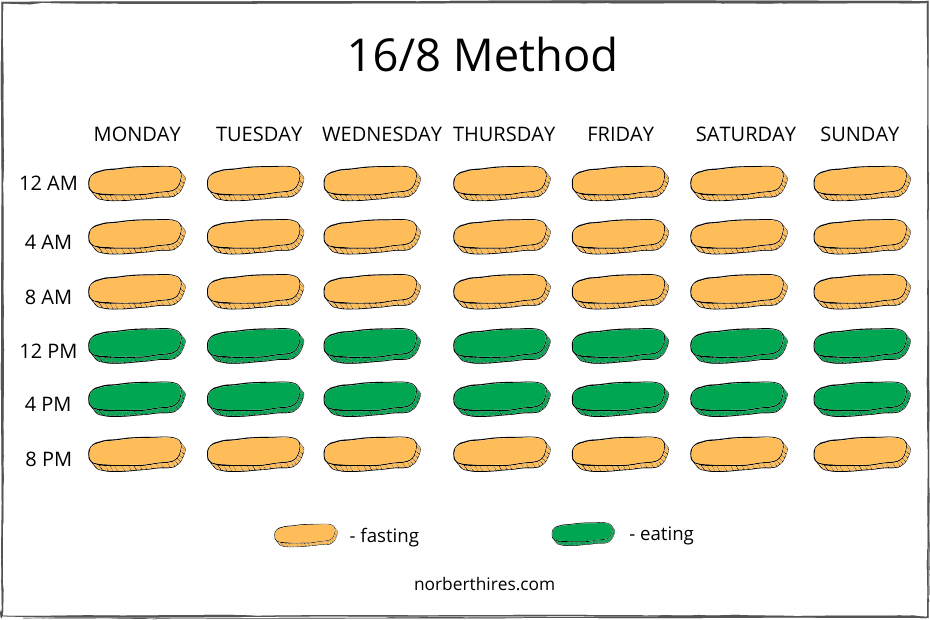
Martin Berkhan built the Leangains protocol in this way of fasting, thanks to which this form of IF became widely known.
It is easy to follow the 16: 8 method, as the 16-hour fast includes night. By leaving an additional meal, we can easily reach 4 p.m.
I also follow the 16/8 method.
The last meal of the day for me is dinner (until 8 pm). The next day I skip breakfast and the first meal is lunch.
However, since I eat every day and the fasting periods are the same, you can easily get used to this schedule. Which makes it hard for me to bring in enough nutrient-rich food in the 8-hour meal window.
2. 5: 2 diet
Eat without any change during 5 days a week, and reduce your calorie intake to 500-600 calories a day for 2 days.
According to the 5:2 method, it is worth reducing the caloric intake of meals on two fasting days to 500 calories for women and 600 calories for men.
Critics of the 5: 2 method rightly point out that no research supports the benefits of this type of meal scheduling. However, reduced-calorie days mean almost a full day of fasting, so those following a 5: 2 diet can also experience research-proven effects of intermittent fasting.
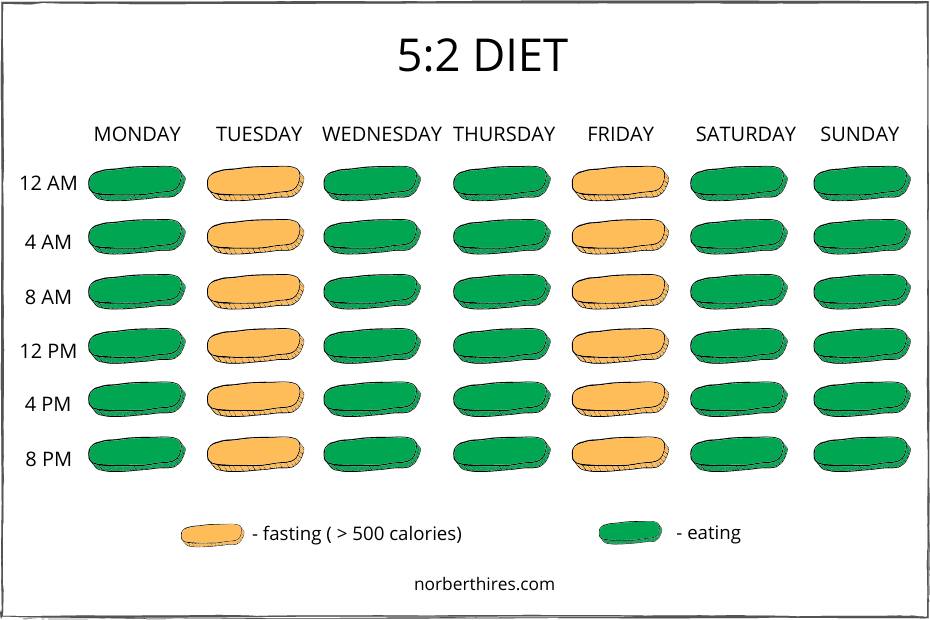
3. Eat-Stop-Eat
Following the Eat-Stop-Eat method, the duration of fasting is 24 hours, which is recommended to be held once or twice a week.
The 24-hour fast program was made famous by Brad Pilon and the popularity of the method has remained unbroken ever since.
Practically if you’re having dinner at 7 pm on Monday, your next meal will be dinner at 7 pm on Tuesday.
You can fast from dinner to dinner or from breakfast to breakfast. In this respect, the method does not specify rules to be followed.
It is more stressful to keep longer fasts, but we are more likely to avoid undereating compared to the 16/8 system.
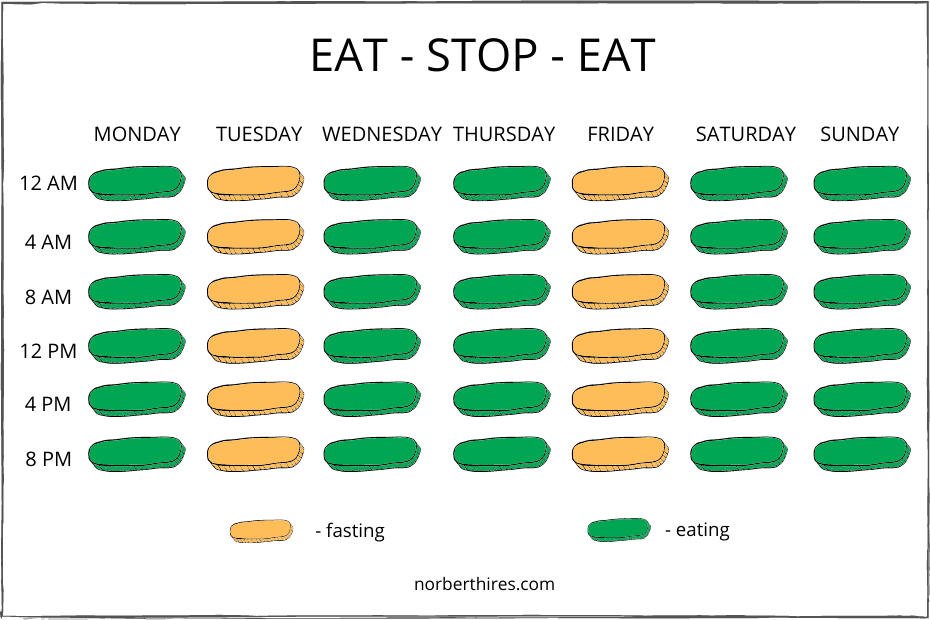
4. One day of fasting per week
Fast once a week for 24 hours.
This is one of the best methods for those familiar with fasting, as it does not require full commitment (1 day per week) and because it is a mental challenge to fast all day, thus effectively preparing you to use fasting after another schedule.
If you want to gain weight or are constantly losing weight with the 16-8 method, fasting one day a week can be a good solution.
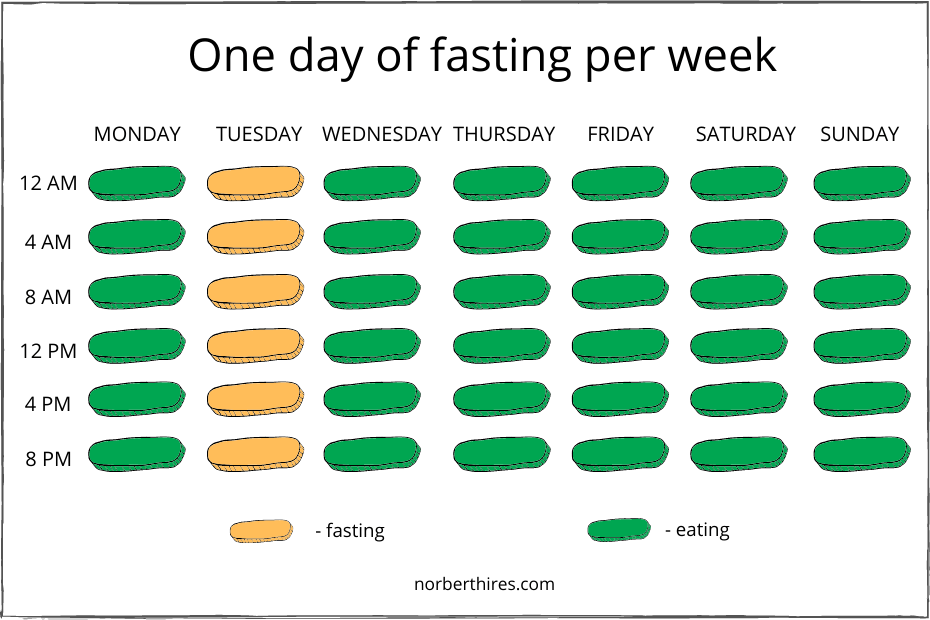
5. Alternate-day fasting
Under fasting on alternate days, 24-hour fasting periods replace 24-hour meal windows. A day spent in full fasting is followed by a day off, then a fasting day again, and so on.
24-hour fasting on alternating days helps to take advantage of longer fasting, which is why this method is most commonly used in studies of intermittent fasting.
While potentially one of the methods with the greatest positive effects, however, we may encounter difficulties in applying it in everyday life.
I’ve never tried fasting on alternate-day and I don’t really plan it.
I don’t see how it fits into an agenda without making me tense and keeping my mind on the next meal during the day.
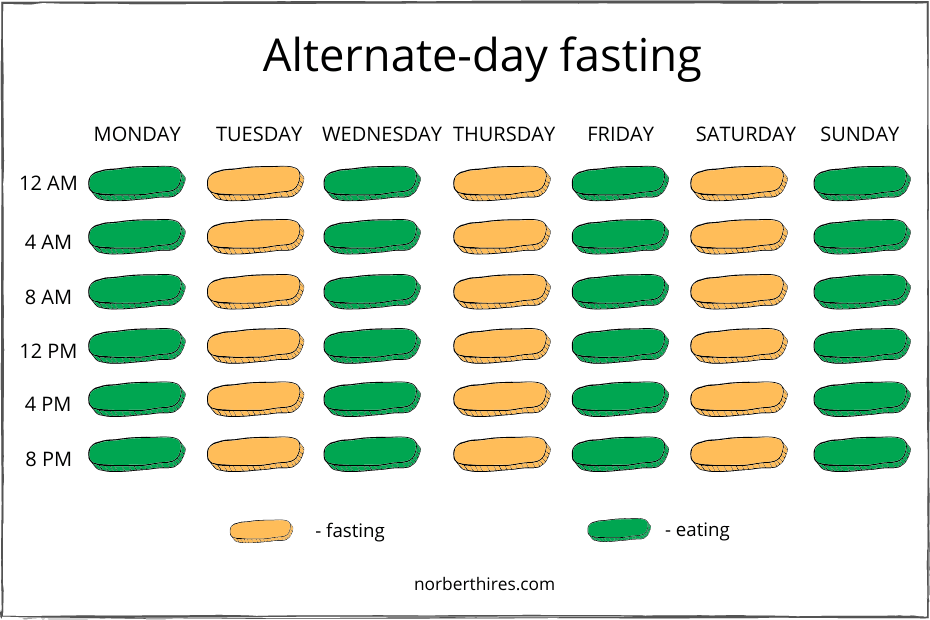
Which intermittent fasting plan should you follow
Each method has a different advantage and implements a fixed agenda differently. While the 16/8 method, for example, can be incorporated into everyday life by almost anyone, fasting on alternating days can be problematic.
Based on the different goals and situations, the following order can be established:
Best fasting methods for beginners:
- One day of fasting per week
- 5: 2 diet
- 16/8 fast
The easiest methods to incorporate into everyday life:
- One day of fasting per week
- 16/8 fast
- 5: 2 fasting
Most effective methods:
- Alternate-day fasting
- Eat-Stop-Eat
- 16/8 fast
How to start fasting?
Because of the many different practices, methods, and benefits, you can be confused about which one should you pick.
If you are considering fasting, it is not worth mindlessly picking one method and trying to stick with it since the real benefits of fasting are shown in the long run.
It is worth starting with small steps, and caution does not hurt.
Step 1: Consult your doctor
I am neither a nutrition consultant nor a doctor.
If an eating method works for me, it doesn’t necessarily mean that everyone should follow or everyone would react to it the same way.
Seek the advice of a specialist who can personally tell you if you are suitable for fasting.
It is definitely not recommended that you fast if any of the following is true for you:
- you are malnourished or anemic
- you are under the age of 18
- you are pregnant.
Step 2: Skip a meal
It’s worth building a fast instead of slapping yourself in the face right away with a full day of fasting. Periodic fasting is a habit that you can effectively develop in small steps.
Mental discomfort is also much easier to deal with little by little (meaning: you won’t be an unbearable jackass during fasting).
While it’s likely to break your suddenly blazing enthusiasm with this simple tip, for most people, skipping a single meal is also a big challenge.
- Try it! When you wake up, when do you feel like you can’t take it without breakfast anymore? Usually, within 2-3 hours of waking up, this familiar feeling is associated with a stomach cramp. How can you expect yourself to miss up to 5 meals right away if leaving breakfast puts a heavy strain on your body?
You have two options to prepare for fasting: either skip dinner or breakfast.
Thus, you will definitely extend the time spent fasting with the hours spent sleeping.
Skip one of your meals for 7 days and then proceed to step 3 if you still have the initial enthusiasm.
Step 3: Try to have dinner earlier while skipping breakfast!
The next step is to gradually extend the period of fasting.
If you miss breakfast, you may be able to schedule dinner a few hours earlier.
With this step, you also build on the hours spent sleeping, which is a useful life hack because you don’t think about how hungry you are while sleeping.
Step 4: Try the 16/8 method.
The previous steps served as a fine primer to keep longer fasts. For beginners, one of the friendliest methods is a schedule with a 16-hour fast and an 8-hour meal window.
By skipping breakfast and eating an earlier dinner, you’re already approaching the 16-hour limit anyway. Try the method and listen to the signals from your body!
16/8 is not some kind of fasting miracle pill. By recommending it, I would rather recommend an effective yet beginner-friendly method to your attention.
Step 5. Experiment!
Variety can have a significant impact on our results in the field of diet and exercise.
We easily get used to certain diets, workout plans, eating methods. By this, I do not mean that if you stick a method with your nails, it will lose its effectiveness.
I say that our body can respond quite well to change.
The greatest results brought by a new method (beyond the long-term benefits) can be experienced in the initial period and then we embark on a more moderated development trajectory.
We reach a level and our development slows down.
To overcome these limits, it is worth varying your fasting approach. Fortunately, there are several tried and tested methods so you can easily shake yourself out of your comfortable routine.
One day a week you can fast, you can go through any of the methods presented, you can experiment with a ketogenic diet, bulletproof coffee, amino acids.
The possibilities are endless, you just need a little creativity.
Answers to the Most Common Intermittent Fasting Questions
Is intermittent fasting healthy?
By eating less intermittent fasting can help you lose weight, boost your metabolism, and live longer. However, fasting can be dangerous too. The method does not specify the amount of food and type of nutrients you should take. Plan your meals during the eating period, take care of nutrients and take advantage of intermittent fasting.
Does intermittent fasting work for weight loss?
Absolutely. The fasting window restricts the amount of food you can consume. By eating less and burning the same amount of calories alone can lead to weight loss.
How long should you do intermittent fasting?
If you are thinking about the long-term effects of fasting then it is definitely recommended to build a habit around fasting and stick to it for years.
Once-in-a-while fasting days can be effective, but the real benefits of intermittent fasting appear in the long run.
How many calories should I eat during intermittent fasting?
It depends on your goals.
Do you want to lose weight? Eat fewer calories than you burn.
Are you interested in gaining muscles? Eat more calories in your eating window.
Is it possible to gain weight with periodic fasting?
Increasing muscle mass with the right amount and quality of training requires a positive calorie deficit, so you need to take in more calories than your body burns.
This is possible with intermittent fasting, however, most people lose weight because they skip meals and do not increase the caloric intake of the remaining meals.
What can you eat during intermittent fasting?
Since intermittent fasting is not a diet, it does not tell you what to eat just when to eat. But it is worth mentioning foods that are suitable for ending a fasting period.
It is worth ending the fast hydrated, so it is recommended to consume enough water. In terms of food, low starch vegetables + lean meats can be a good choice. Broccoli, cauliflower, eggplant, celery stalks, purple cabbage… Processed foods, alcohol, eggs, and dairy products should be avoided.
I often finish fasting after a workout with a protein smoothie. It worked for me.
What can you drink during the fasting period?
Drinks that do not contain calories should be consumed during periodic fasting. So in addition to water, you can also drink tea and coffee (without milk, sugar, and sweeteners, of course).
Can I Chew Gum While Intermittent Fasting?
Most chewing gums contain some sweetener that has minimal ability to trigger an insulin response. However, the extent of this is so low that it has little effect on the results achieved.
Technically, chewing can break the fast, but I wouldn’t worry about 5-10 calories per chew. For me, a much bigger problem is the chew-induced feeling of hunger that can hurt a fast if you can’t stand it to the end.
I do not recommend chewing during fasting, but it is a fact that a chew has little effect on the results obtained with fasting.
I wouldn't worry about it.
I am tired after fasting. What can I do?
If you break the fast with a big meal after 16 hours of fasting, it is almost guaranteed that you will be tired. It is worth moderating the amount of the first meal. This can reduce the feeling of tiredness after breaking the fast.
Fasting is a stressful situation for the body. During fasting, cortisol is released in the body, so irritability is natural at some level. Personally, over time, I got used to fasting and my irritability also decreased.
You may want to reduce other sources of stress, get enough sleep, and moderate your caffeine intake.
Is it allowed to drink coffee during periodic fasting?
Coffee consumed without milk, sugar, and sweetener does not interrupt fasting as it does not trigger an insulin response.
I like morning coffee during fasting because it helps control hunger. However, we must also mention the potential negative effects of coffee.
Unfortunately, the caffeine in coffee not only makes us more alert but also promotes the production of the number one stress hormone, cortisol.
Fasting alone is a stressful situation for the body, and coping with a cortisol stroke is not necessarily a smart thing to do.
For people who are sensitive to caffeine, coffee consumed on an empty stomach can also lead to heartburn and acidification.
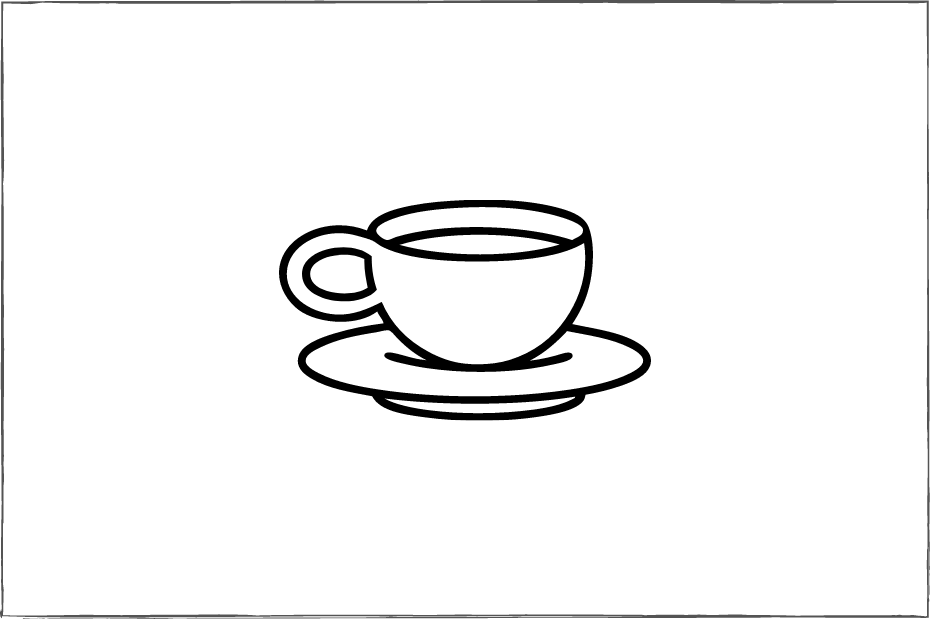
Can you drink coffee while fasting?
If you become acidic and react poorly to coffee consumed on an empty stomach, preferably do not combine fasting with coffee.
Otherwise, coffee can even help control your hunger.
Can you put milk / coconut milk / honey / sweetener into your coffee during fasting?
All of these breaks fasting.
Drink black coffee when you are fasting. If you can not let a morning coffee go without sweeteners, then try another fasting method or diet.
Amino acids in addition to periodic fasting?
It may seem logical to consume branched-chain amino acids (BCAAs) in addition to fasting, as amino acids that are components of proteins help maintain muscle mass.
There are times when it is helpful to reach for BCAAs, but the amino acids practically break the fast. It’s like consuming small portions of protein, so it counts as a meal.
As an exception, it is worth treating training during fasting.
In this case, it is worth consuming BCAAs because they serve as energy to the muscles and we benefit more from that few grams of amino acids than the disadvantage of stopping fasting.
Martin Berkhan, the father of the Leangains method, also suggests the use of amino acids in training on an empty stomach.
Is it mandatory to skip breakfast?
You can have several compelling reasons to stick to breakfast. It’s hard to imagine a life without bacon fried eggs and fruity oatmeal.
Even with fasting, you don't have to banish breakfasts.
You can choose a schedule that requires you to skip 1-2 breakfasts a week (5: 2 diet, Eat-Stop-Eat).
If you only want the typical breakfast food, then there is nothing easier than eating the food you want later in the day.
Regardless of whether I fast in the 16/8 split, I sometimes have breakfast regardless of the fasting schedule.
One day a week has no significant effect on my results, but it makes fasting much more sustainable in the long run.
Intermittent fasting is a journey
Periodic fasting is not an elixir and is not the only nutritional system that can be followed. Because IF doesn’t tell you what to eat, so if you’re transferring your previous bad eating habits to a new schedule, you shouldn’t expect significant results.
Intermittent fasting is gaining traction around the world for good reasons. Hugh Jackman , Chris Hemsworth , Terry Crews, or Nicole Kidman also stay in shape by fasting. In addition to the hype, there are other aspects to consider.
While fasting can successfully help you build a healthy body composition and improve your well-being, there are times when it is not the best solution. If you have an ectomorphic physique, and your main goal is drastic weight gain, I’d rather vote for a traditional three-hour meal plan.
In addition to weight loss, intermittent fasting has numerous physiological effects (growth hormone growth, improved insulin sensitivity, autophagy…) so if you are healthy (and want to stay healthy), it may be a logical choice to incorporate fasting into your daily routine.
I hope this guide helps you get started.
For further help, I recommend Brad Pilon’s book Eat-Stop-Eat , Martin Berkhan’s blog , and as motivation, browsing the r / intermittentfasting subreddit.



